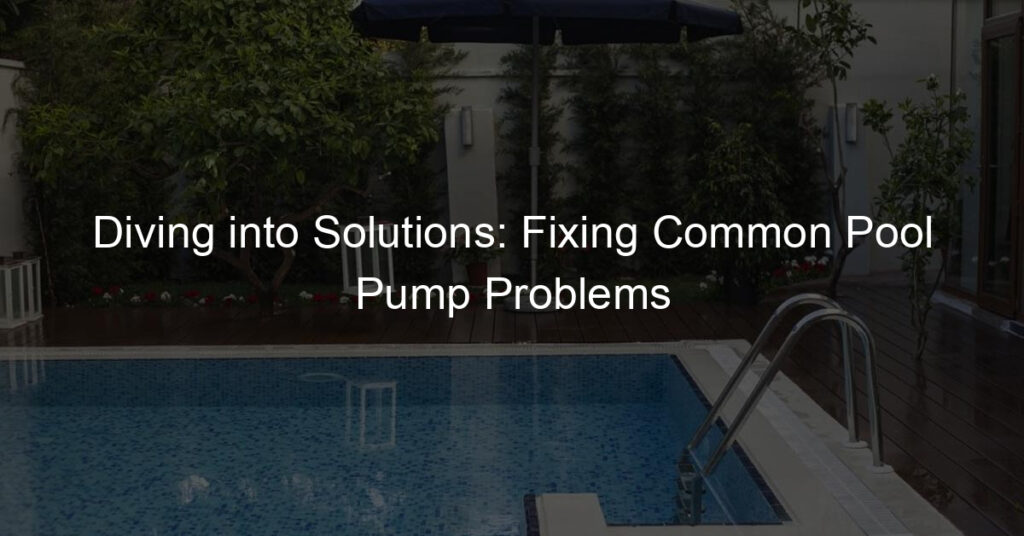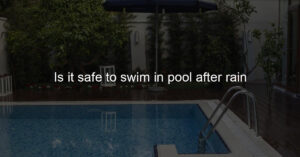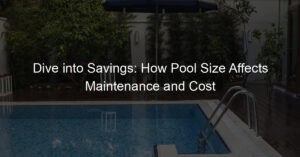Introduction to Pool Pump Problems
Swimming pools are a great way to relax, exercise, and have fun. But, like any other part of your home, they require regular maintenance. One of the most crucial components of your pool is the pool pump. Let’s dive into understanding its importance and the common signs of pool pump problems.
-
Understanding the Importance of a Pool Pump
The pool pump is the heart of your swimming pool. It circulates water through the pool’s filtration system, keeping it clean and safe for swimming. Without a properly functioning pool pump, your pool water can become stagnant and unsafe. It’s essential to keep an eye on your pool pump and ensure it’s working correctly.
-
Common Signs of Pool Pump Problems
Just like any other mechanical device, pool pumps can develop problems over time. Here are some common signs that your pool pump might be having issues:
- Noisy operation: If your pool pump is making more noise than usual, it could be a sign of a problem. This could be due to a worn-out motor or a problem with the pump’s internal components.
- Reduced water flow: If the water in your pool isn’t circulating as it should, it could be a sign that your pool pump isn’t working correctly. This could be due to a blockage in the pump or a problem with the pump’s motor.
- Leaking water: If you notice water leaking from your pool pump, it’s a clear sign of a problem. This could be due to a cracked pump housing or a problem with the pump’s seals.
These are just a few of the signs that your pool pump might be having problems. If you notice any of these issues, it’s important to address them as soon as possible to prevent further damage to your pool pump and keep your pool safe and clean.
Common Pool Pump Faults and Their Symptoms
Pool pumps are an essential part of any swimming pool. They help keep the water clean and safe for swimming. However, like any other machine, they can develop faults. Here are some common pool pump problems and their symptoms:
- Pool pump motor issues: The pool pump motor is the heart of the pool pump. If it’s not working properly, your pool pump won’t be able to do its job. Symptoms of pool pump motor issues include strange noises coming from the pump, the pump not starting, or the pump shutting off unexpectedly. If you notice any of these symptoms, it’s important to get your pool pump motor checked as soon as possible.
- Pool pump failure: Pool pump failure is a serious issue that can lead to dirty and unsafe swimming pool water. Symptoms of pool pump failure include the pump not turning on, the pump not pumping water, or the pump leaking water. If your pool pump is showing any of these symptoms, it’s crucial to get it repaired or replaced immediately.
- Swimming pool pump problems: There are many different types of swimming pool pump problems. Some common ones include the pump making loud noises, the pump vibrating excessively, or the pump not priming. These problems can be caused by a variety of issues, such as a clogged pump basket, a damaged pump seal, or a faulty pump impeller. If you’re experiencing any of these problems, it’s important to get your pool pump inspected and repaired by a professional.
Remember, the sooner you identify and address these issues, the better. Regular maintenance and timely repairs can help keep your pool pump running smoothly and efficiently, ensuring a clean and safe swimming environment.
Pool Pump Troubleshooting Guide
When your pool pump starts acting up, it can be a source of stress. But don’t worry! This guide will help you identify and troubleshoot common pool pump problems. Let’s start by identifying the problem.
Identifying the Problem
The first step in troubleshooting your pool pump is to identify the problem. Here are some common signs that your pool pump might be having issues:
- Observing unusual noises or vibrations
- Checking for leaks or water flow issues
- Inspecting for overheating or electrical issues
If your pool pump is making strange noises or vibrating more than usual, it could be a sign of a problem. This could be due to a variety of issues, such as a clogged impeller or a failing motor. Make a note of when and how these noises or vibrations occur, as this information can be useful in diagnosing the problem.
Leaks or water flow issues can also indicate a problem with your pool pump. Look for puddles of water around the pump or reduced water flow in your pool. These could be signs of a leaky seal or a blockage in the pump.
If your pool pump is overheating or experiencing electrical issues, it’s a clear sign that something is wrong. This could be due to a faulty motor, a short circuit, or other electrical problems. Be sure to turn off the pump and unplug it before inspecting for these issues to ensure your safety.
Once you’ve identified the problem, you can move on to fixing it. The next section of this guide will provide you with step-by-step instructions on how to repair common pool pump issues. Stay tuned!
Fixing Pool Pump Issues
Pool pump issues can be daunting, but with the right knowledge and a bit of patience, you can fix them yourself. Here are some common pool pump problems and how to fix them:
- How to Repair a Leaky Pool Pump
- First, identify the source of the leak. It could be from the pump seal, the pipe connections, or the pump lid.
- Once you’ve identified the source, switch off the pump and drain it.
- If the leak is from the pump seal, you’ll need to replace it. For pipe connections, tightening them might solve the problem. If the pump lid is the culprit, ensure it’s properly sealed.
- After making the necessary repairs, turn on the pump and observe if the leak persists. If it does, consider seeking professional help.
- Steps to Resolve Motor Issues
- Start by checking if the motor is overheating. If it is, ensure it’s not running for too long and that it’s well ventilated.
- If the motor is not starting, it could be due to a faulty capacitor. You’ll need to replace it.
- If the motor is noisy, it could be due to worn-out bearings. Replacing them can solve the problem.
- Fixing Common Electrical Faults
- Start by checking the circuit breaker. If it’s tripped, reset it.
- If the pump is not getting power, check the power cord for any damages. If it’s damaged, replace it.
- If the pump is still not working, it could be due to a faulty motor or a problem with the internal wiring. In such cases, it’s best to seek professional help.
Leaky pool pumps are a common issue that can lead to water wastage and increased energy bills. Here’s how you can repair a leaky pool pump:
Motor issues can cause your pool pump to malfunction. Here are steps to resolve common motor issues:
Electrical faults can cause your pool pump to stop working altogether. Here’s how to fix common electrical faults:
Remember, always ensure your safety when dealing with pool pump issues. If you’re unsure about any step, don’t hesitate to call a professional.
Pool Pump Maintenance
Maintaining your pool pump is crucial to ensure its longevity and optimal performance. Let’s delve into the key aspects of pool pump maintenance.
- Regular Cleaning and Inspection
- Proper Winterization Techniques
- Importance of Regular Professional Servicing
Regular cleaning and inspection of your pool pump are essential to keep it running smoothly. This involves checking the pump basket and cleaning it out regularly, as well as inspecting the pump for any signs of wear and tear. It’s recommended to clean your pool pump at least once a week during the swimming season, and once a month during the off-season.
Winterizing your pool pump is another important maintenance task. This process involves draining the water from the pump and its pipes to prevent freezing and cracking during the cold months. It’s best to start winterizing your pool pump when the temperature consistently drops below freezing. Remember to always refer to your pump’s user manual for specific winterization instructions.
While regular cleaning and winterization are tasks you can perform yourself, it’s also crucial to have your pool pump professionally serviced at least once a year. Professional servicing includes a thorough inspection, cleaning, and any necessary repairs. This ensures that your pump is in top condition and can help prevent costly repairs down the line.
In conclusion, pool pump maintenance involves regular cleaning and inspection, proper winterization, and annual professional servicing. By adhering to these practices, you can ensure that your pool pump lasts longer and functions efficiently.
Case Studies: Pool Pump Repair
In this section, we will look at some real-life examples of pool pump repair. These case studies will help us understand the common problems that can occur with pool pumps and how they can be fixed.
Case Study 1: Overcoming Motor Issues
One of the most common problems with pool pumps is motor issues. Let’s take a look at a case where a pool owner was able to overcome this problem.
- Problem identification: The pool owner noticed that the pump was making a loud noise and was not pumping water efficiently. After some investigation, it was found that the motor was overheating due to a faulty capacitor.
- Steps taken for repair: The pool owner called a professional repair service. The technician replaced the faulty capacitor and also cleaned the motor to remove any debris that might have been causing the motor to overheat. The pool pump was then tested to ensure it was working properly.
- Key takeaways: Regular maintenance and cleaning of the pool pump can prevent motor issues. If the pump starts making a loud noise or is not pumping water efficiently, it is a sign that there might be a problem with the motor. In such cases, it is best to call a professional repair service.
In conclusion, overcoming motor issues in a pool pump can be a challenging task. However, with regular maintenance and timely repair, these problems can be avoided. Always remember, a well-functioning pool pump is essential for maintaining a clean and healthy pool.
Case Study 2: Fixing a Leaky Pump
Let’s dive into our second case study, where we tackled a leaky pool pump. This is a common issue many pool owners face, and understanding how to address it can save you both time and money.
- Problem Identification
- Steps Taken for Repair
- First, we switched off the pump and disconnected it from the power source for safety.
- Next, we removed the pump cover and drained the water.
- We then replaced the faulty seal with a new one, ensuring it was securely fitted.
- Finally, we reassembled the pump, turned it on, and monitored it for any signs of leakage.
- Key Takeaways
Our client noticed a consistent loss of water from their pool. Upon inspection, we discovered the pool pump was leaking. The leak was traced to a faulty seal within the pump.
We followed a systematic approach to fix the leaky pump. Here’s a step-by-step breakdown:
This case study emphasizes the importance of regular pool pump maintenance. A simple seal replacement resolved the leak, preventing further water loss and potential damage to the pump.
Remember, if you notice a consistent drop in your pool’s water level, it’s crucial to check your pump for leaks. Early detection and repair can save you from more costly repairs down the line.
| Problem | Solution | Key Takeaway |
|---|---|---|
| Leaky Pool Pump | Seal Replacement | Regular maintenance and early detection can prevent costly repairs |
Conclusion: Preventing Pool Pump Problems
As we conclude, it’s essential to understand that the key to avoiding pool pump problems lies in regular maintenance and professional repair. Let’s delve into these aspects and why they are crucial.
- Importance of Regular Maintenance
- Benefits of Professional Pool Equipment Repair
- Final Thoughts on Pool Pump Troubleshooting
Regular maintenance is the backbone of a healthy pool pump. It’s like taking your car for regular servicing to ensure it runs smoothly. By regularly cleaning and inspecting your pool pump, you can identify potential issues before they become significant problems. This proactive approach can save you time, money, and the inconvenience of a malfunctioning pool pump.
While DIY methods can be helpful for minor issues, professional pool equipment repair comes with its unique benefits. Professionals have the right tools, knowledge, and experience to handle complex problems. They can accurately diagnose and fix issues, ensuring your pool pump operates efficiently. Moreover, professional repair often comes with a warranty, providing you with peace of mind.
Pool pump troubleshooting is a skill that every pool owner should have. It helps you understand your pool pump better and take immediate action when something goes wrong. However, remember that not all problems can be fixed with troubleshooting. When in doubt, it’s always best to call in the professionals.
In conclusion, preventing pool pump problems doesn’t have to be a daunting task. With regular maintenance, professional repair, and basic troubleshooting skills, you can ensure your pool pump stays in top shape. Remember, a well-functioning pool pump is key to a clean, healthy, and enjoyable pool.














